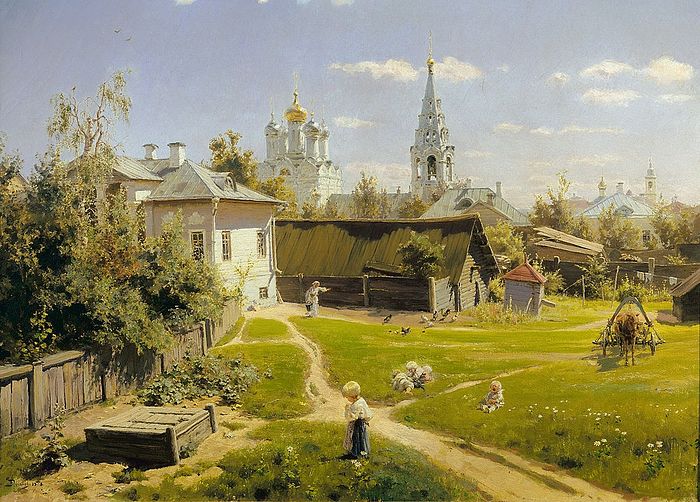Confession is the most important component of the spiritual life of every Christian, both adults and children. At what age should children begin to go to Confession? How to explain to them the essence of this Mystery? How to prepare for Confession? What can help to overcome the hesitation or even fear in our young people? We discussed this with Archpriest Artemy Vladimirov—spiritual father of the stavropegial Convent of St. Alexis in Moscow, teacher at St. Tikhon’s Orthodox Humanitarian University, and author of books and brochures on questions of child education and moral theology.
—Fr. Artemy, what is Confession? What occurs in the soul during confession?
—I think that Confession is best of all explained with the word “mystery.” A mystery is something concealed from the external gaze. Something happens in the invisible world—something that transcends our human strength and comprehension.
Confession is an encounter with Him Who took upon Himself the sins of all mankind. And He extends His hands to everyone who, as unworthy, with Confession comes to his Parent. In the mystery of Confession the priest most certainly does not occupy the main place. I would call him a nurse, an assistant of the Heavenly Luminary, the Surgeon, and Doctor of body and soul, Christ the Savior, Who works all healings in response to our admission of ourselves as imperfect, sinful, guilt-ridden, having broken the covenant of love, having repeatedly erred. In response to a candid confession and sincere desire to change something in your life, to change from the worse to the better, the Lord immediately gives you through the priest His Divine energy. He renews in your heart the activity of grace, which as a spark, glistens, even under the bushel of sins. In this way, we should always approach Confession as if it’s the first time—and at the same time as if it’s the last, understanding that our Savior Himself by the Holy Spirit accomplishes this neurosurgery, healing both soul and body as recompense for our faith in His omnipotence and grace and as recompense for our faith in His Church.
—At what age can we lead a child to Confession?
—Many are guided by the Resolution of the Ruling Synod. In the nineteenth century it was recommended to bring a child to Confession from the age of seven. However, times are changing, and people are changing. Today children are more grown-up than in the times of our fathers the Tsars, maybe because sins have multiplied upon the earth. Innocent five and six year olds are already, in reality, coming into contact with the realm of sin. It is difficult for parents to safeguard the gaze and hearing of a child from the elements of this world. Therefore, all is determined by the desire of the child himself.
And for me, as a priest, it is obvious that if a child goes to an attentive priest, who is himself a parent and has experience in opening his own conscience, such a friendship between a spiritual Uncle Styopa1 and the child, no longer a babe in the woods, but not yet a Dennis the Menace, will have beneficial consequences for the lad or lass, because here a child encounters the workings of Divine grace.
—And how should we properly attune and prepare a child for Confession?
—Unfortunately, here modern parents experience many particular difficulties. They suffer from spiritual mumbling. They have neither sufficient words nor acumen to prepare their youngster for Confession and Communion. Meanwhile, the primary focus here should be not on the reading of the prayer rule—it’s good, but here, as in a homeopathic pharmacy, there should be a small rule. The main thing is to verbally guide a child into the world of sacred conceptions. “Mikey, do you remember Who will be waiting for us tomorrow in our beloved church? With a beard and kind eyes … And most importantly—He remembers that you confessed to Him last week. What do you think—does the priest absolve your sins, or Him Who stands behind you—our Savior, crucified and risen?” Here by such guiding questions: “What did we want to say to our spiritual father? Mikey, just don’t forget that it’s necessary to confess clearly and distinctly. And name from the first what ails, for which we were especially ashamed. The day before last you ate a five-liter jar of raspberry jam all by yourself …” One way or another, with a smile and warmth, gently and reverently mama or the godparent must communicate with the child.
The righteous Alexei Mechev gives us a general methodological key. When asked how should we relate to a person, how to approach him, how to begin a conversation with him, he answered—in the beginning of the twentieth century—that we should relate to a man with reverence, as to a newly-blossomed flower.
—The next question is not just about children, because adults are sometimes embarrassed that someone might hear them during Confession. How can we overcome such fear and embarrassment?
—Confession is truly not intended for others’ ears. And I agree with those priests who arrange it in such a way that deceptive embarrassment and shyness do not bedevil your soul. Batiushka might summon the confessee to himself to meet him somewhere on the solea near the iconostasis or in the corner, where there is created an intimate, private atmosphere. But on the other hand, I would recommend going to Confession repeating within yourself the words: “Lord, let the whole world condemn me, but only not Thee.” Let us recall that in the ancient Church there was public Baptismal Confession, when a person, drawing near to the baptismal font, before the entire community would unveil all of his secrets and manifest falls.
But all the same, today we have delicate, half-witted people, and therefore another, perhaps, will think beforehand what he wants to say to father, and will inscribe it in general strokes on a sheet, and the priest will have to take the confession deeper by means of his questions.
May God grant that our batiushkas be not deaf as am I, loudly repeating to the entire church: “My son, you say that in your years as a schoolboy you stole a cucumber from the field at the communal farm?” Not everyone can suffer such country simplicity.
—And still, if a child is afraid to go to the priest for Confession the first time—what to do?
—I think it would be possible beforehand to speak with the priest, so that he might relate with special attention to this little bunny, from fear lowering his ears, and folding his paws upon his chest. Actually, much depends on the priest. The priest should be very psychological. Emulating the Heavenly Father, he should with a smile and love meet the little man. And much depends even on the form of the question. Is there a difference in questions? The first variation: “Come on, why are you silent? What do you want to say? Speak!” The second variation: “I am glad to see you, Mashenka.2 What would you like to reveal to the Lord today? What in your life has been not so good?” And children inevitably will reward not the priest, maybe, but they will reward their parents with the desire to confess them when the beam of Divine love through the mouth and heart of the priest sanctifies their little hearts.
I recall how little school children sometimes reveal their hearts to the priest. There stands a first-grader—just like the hero of the Polenov picture, “Moscow yard”: blonde-haired with a bowl cut. He tells batiushka—I’m not retelling a confession, I’m not saying who, where, when—it’s a generalized case: “Yesterday I almost stepped on my cat’s tail.” Batiushka will be surprised and think to himself: “In fact you didn’t step on it. It’s not a sin!” But a child confesses that he was close to causing a discomfort for the four-legged furry kitten. So you’ll say to him with a serious look: “God will forgive you, be careful.”
Here’s another example. I see a girl who’s clenching some paper in her sweaty fist, and on it are a few points. First, second, third, fourth, fifth … This little bunny has come to confess. Come on, let’s unfold the paper. And you see sin number three: “I’m looking for the ideal.” In the registry of her sins she has placed the search for the ideal. You know, you immediately want to clutch your chest, because—terra incognito! Such an unknowable, mysterious and beautiful human soul. Where is the sin here? Of course it’s not in seeking the ideal: “I remember the marvelous moment, you appeared before me …”3 But she hasn’t yet found it in her life. Maybe, she mistakenly chose Pippi Longstocking as an ideal, or some kind of Ellochka the Ogress from “Twelve Chairs.”4 But he who seeks—the same shall find. And for a priest it’s convenient to point to the face on the Vladimir icon and say: “Here is the Ideal! Embodied beauty, purity, and love.”
—From your pastoral experience, how seriously do children approach their first Confession?
—Children approach their first Confession, I think, much more seriously than back-to-school day. These white vests with gladioli flowers in hand, with a new handbag (not backpacks anymore, unfortunately), walk into the schoolyard… and he finds a totally unfamiliar, mysterious life. The first insight is when the teacher writes in calligraphy on the black board: “Homeland, mama,”—and now it’s possible to write with a capital letter: “God” …
The first Confession is an ascension to the Divine Paradise wherein the priest—an image of the Heavenly Father—meets a beloved creation of the Lord and guides him into the beautiful and bright world of Divine communion. And here, it seems to me, the pastor must reverently sense the presence of God. At the Cross and Gospel stands Christ, stretching out His hands towards His image and likeness.
Children of 6-7 years old, whose parents keep them in the condition of their pre-adolescent stage, are psychologically timid and fearful. Until then, they simply confessed their sins to mama and grandma. And what will batiushka say? I remember how I went to my first Confession, as to the gallows, like Emelian Pugachev driven to Red Square.5 I tried to picture: what will this pastor say? And with what kind of rod will he beat me over the head, having learned who I really am? Glory to God that I happened upon such a priest—I still pray for the repose of his soul—who warmheartedly leaned in towards me and asked: “What is your name?” “Tyoma.”6 “Well, Artyomushka,7 tell me, what is in your heart?” Since then I remember that “Artyomushka,” and I try to bury the whip in the folds of my riassa, but to reserve gingerbread, that is a verbal, tender approach for the repentant sinner.
—How often can and should a child go to Confession?
—People speak differently about that. Many of our parishioners today know the wise brochures, composed ten years ago by Archpriest Vladimir Vorobiev, who had great experience with Confession, in which he recalls that in his adolescent years children didn’t confess so often. On the one hand, it was the Soviet era, and for children it wasn’t so easy to wind up in church. On the other hand, parents preferred not to frequent these minutes of revelation, because it could become commonplace. The soul of an inexperienced little child gets used to everything. And it’s very bitter when Confession becomes some kind of mechanical enumeration of sins, repeating them time after time. The conversation proceeds—and it goes without saying—not about oversleeping and overeating, but that you took something without asking or called your comrade a bad name…
That’s why a priest should, in my view, understand that he shouldn’t receive a child to Confession formally, but to gift him something—for example, a book of spiritual content, corresponding to his psychological age, and plucked from the paradisiacal garden of fruit, so that the child will remember these one and a half minutes of communication. Batiushka shouldn’t have tired, bleary eyes after 588 confessions … But, as we just made clear, he should look upon the child as upon family, with a smile, so that this meeting would leave a warm and light trace in the child’s soul.






